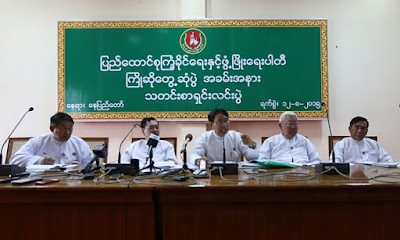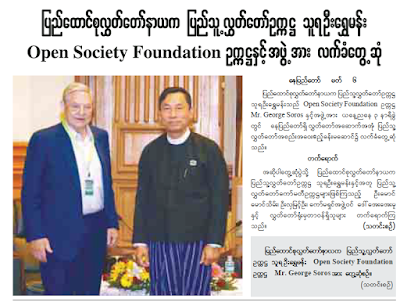 |
| Parliament Speaker Shwe Mann's sudden removal by Army. |
Security forces surrounded the headquarters of the ruling Union Solidarity and Development Party (USDP) in the capital, Naypyitaw, late on Wednesday and prevented members there from leaving. Family members said Mr Shwe Mann was also detained by the army at his home in Naypyidaw when the soldiers took control of the USDP compound, where party members were hosting a meeting without him.
Mr Shwe Mann's ousting from the party follows rare discord within the establishment over the role of the military, which handed power to a semi-civilian government in 2011 but retains an effective veto over the political system.
"Shwe Mann isn't the chairman of the party anymore," said a USDP member of parliament."He's in good health and at home now." Mr Shwe Mann still holds the position of speaker of parliament, the source said, speaking on condition of anonymity due to the sensitivity of the subject, but has been replaced as party
Meanwhile, secretary general Maung Maung Thein, a supporter of Mr Shwe Mann, was also ousted from his post in a phone call he took from home. He is to be replaced by one of the president's closest aides Tin Naing Thein, a senior party official said.
Tension rose between the president and Mr Shwe Mann, both former top military officers, over the selection of candidates for the November election, party sources said earlier. The two are old rivals and both have suggested they would accept the job of president after the November 8 parliamentary election.
 |
| USDP leaders announcing the resignations of Shwe Mann and his gang from their USDP posts. |
Late on Wednesday, several trucks of soldiers and police officers arrived at the ruling party's headquarters. After the security forces took control of the compound, Soe Tha, one of the founders of the USDP, and Htay Oo led a late-night meeting of senior party officials that lasted into the early hours of Thursday, party members said. Both men are close to the president.
Mr Shwe Mann and high-ranking party members considered to belong to his faction in the USDP were not present at the meeting, the sources said. The security forces left after the meeting concluded at around 2:30am, sources said.
"What I heard ... was that there was a lot of reorganisation in the party last night," said government spokesman Ye Htut, who said he could not give further details as he is not a member of the party.
Mr Shwe Mann was a presidential hopeful
when the military handed over power to a semi-civilian government after 49
years of rule in 2011. Despite the establishment of the new government, the
military has resisted recent efforts to introduce constitutional amendments to
loosen its grip.
The USDP is comprised largely of former military officers and was created from a social movement set up by the former junta. The constitution reserves 25 per cent of seats in parliament for unelected military officers.
Changes to the constitution require the support of at least 75 per cent of lawmakers, giving the military an effective veto over changes. An amendment that would have seen the threshold of support lowered to 70 per cent failed, as expected, to gain enough support with lawmakers in a June vote.
 |
| Shwe Mann is believed to be in the deep pockets of George Soros. |
Burmese security forces have surrounded the headquarters of the ruling Union Solidarity and Development party in the country’s capital, Naypyidaw, and senior regime figures have been removed from their posts, as tensions mount ahead of elections in November.
Sources within the headquarters of the USDP – which is effectively a political extension of the military – said on Thursday that Shwe Mann, party chairman and Speaker of the parliament, had been deposed and was under police guard. His closeness to opposition leader and democracy figurehead Aung San Suu Kyi is believed to have soured his relationship with military leaders in Burma, also known as Myanmar.
“Police entered the party compound last night. Since then no one was allowed in or out,” Toe Naing Mann, Shwe Mann’s son, told Agence France-Presse on Thursday morning. “So-called guards” were also outside his father’s residence in the capital, he said.
Several trucks of soldiers and police officers arrived at the compound at around 10pm on Wednesday, sources said. “We have not been allowed to move around since late yesterday,” said one party member. The USDP general secretary, Maung Maung Thein, has also reportedly been forced from his post. “They called me and told me I don’t need to come to the office anymore,” he told Reuters.
The moves comes amid a tussle for control of the USDP. Tension has reportedly risen between leaders of the military-backed government over the selection of candidates to run in the 8 November general elections.
The elections – which had been touted as potentially the most free in decades – are set to be contested by Aung San Suu Kyi, who was a thorn in the side of the previous junta regime with her years of campaigns for democracy.
Recent months have seen growing talk of animosity between Shwe Mann and President Thein Sein, both former generals who shed their uniforms to take part in controversial 2010 polls that heralded a new quasi-civilian government, which has ushered in sweeping reforms.
 |
| President Thein Sein (L) was ordered by Than Shwe's Min Aung Hlaing to remove Shwe Mann (R). |
Tensions began to heighten earlier this week when the USDP, now choosing its candidates for the election, overlooked some senior military officials during a party convention. A group of 149 army officers had resigned their posts on Wednesday hoping to take part in the election but only 59 were approved as candidates.
The leading local political commentator Yan Myo Thein called Shwe Mann’s removal a “purge” and warned that the party’s internal strife had the potential to disrupt progress towards democracy. “I think primarily that is the ruling party’s internal affair, but the internal struggle of the ruling party can threaten the democratisation process of [Burma],” he said.
“Because of the power struggle and incidents inside the ruling party, the upcoming general election can be postponed. If the election is postponed the process of democratisation in Myanmar will be delayed. “People are expecting to have a new government made up of the majority opposition [the National League for Democracy] and the ethnic minority parties.”
Yan Myo Thein said it was so far unclear whether the purge was initiated by serving military officials. “Most of the leaders are retired military generals so that they may have direct or indirect relations with the serving military generals,” he said. “But I’m not sure of the role of the military in the recent purge.”
The move comes after years of rumours of a split in the ruling party between Thein Sein and Shwe Mann – the latter seen as being close to Aung San Suu Kyi. A recent petition backed by military officials sought to impeach Shwe Mann for his role in proposing amendments to the military-drafted constitution, which were anyway rejected.
U Nyan Win, a spokesman for Aung San Suu Kyi’s party, the National League for Democracy, said the party was not involved in events in Naypyidaw and declined to speculate on the reasons behind it. He noted, however, the deadline for political parties to decide their candidate lists for election. “The last day is tomorrow [Friday] but we don’t know what is happening with them,” he said. “We are just finalising our own list now.”
The USDP has been the vehicle for the former junta elites to metamorphose from soldiers to MPs. But there is internal tension over the speed of democratic reforms and the loosening of the military’s grip on power, which it has held for more than half a century.
Army Thinks Shwe Mann Is Too Close To ASSK
 |
| Shwe Mann & ASSK at a joint press conference. |
The Nobel laureate Aung San Suu Kyi – the daughter of Burma’s independence hero General Aung San, and the country’s democratic icon for a generation – led her party, the National League for Democracy, to victory in Burma’s election in 1990, but the party was never allowed to take power.
Aung San Suu Kyi spent 15 of the next
21 years under house arrest. She was banned from standing in Burma’s first
elections in a generation, held in 2010, and the NLD boycotted the poll.
She was still under house arrest at the
time of the election – until released a week later – and has since been elected
to parliament in a byelection. Her participation in this year’s election is
being seen, both inside Burma and out, as a major step forward in the country’s
democratic reforms. She has vowed that if her party, the NLD, wins it will
amend the constitution to weaken the military’s hold on parliament. But
military figures are expected to remain significant political players.
Related posts at following links:
Shwe Mann: Burma's Powerful Parliament Speaker and A Secret Billionaire
Related posts at following links:
Shwe Mann: Burma's Powerful Parliament Speaker and A Secret Billionaire